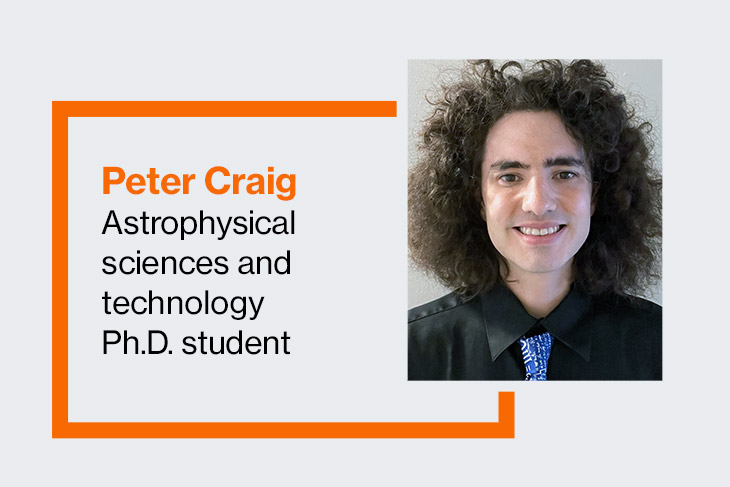Astrophysical sciences and technology Ph.D. student receives DOE award to study dark matter
Peter Craig received an Office of Science Graduate Student Research program award
RIT astrophysical sciences and technology Ph.D. student Peter Craig received an award from the U.S. Department of Energy’s Office of Science Graduate Student Research (SCGSR) program that will support a research project to investigate the distribution of dark matter in the universe.
An RIT astrophysical sciences and technology Ph.D. student received an award from the U.S. Department of Energy’s Office of Science Graduate Student Research (SCGSR) program that will support a research project to investigate the distribution of dark matter in the universe. RIT’s Peter Craig is one of 65 graduate students from 29 states to receive the award and it will fund him to conduct research at Lawrence Berkeley National Laboratory.
The program’s goal is to prepare graduate students for STEM careers critically important to the DOE Office of Science mission, by providing graduate thesis research opportunities at DOE laboratories. The SCGSR program provides supplemental awards to outstanding U.S. graduate to pursue part of their graduate thesis research at a DOE laboratory/facility in areas that address scientific challenges central to the Office of Science mission. The research opportunity is expected to advance the graduate students’ overall doctoral thesis while providing access to the expertise, resources, and capabilities available at the DOE laboratories/facilities.
“This award is a fantastic opportunity to pursue interesting research in a new setting, and I am honored to have been selected,” said Craig. “I'm hoping to learn some new skills, meet lots of interesting people, and to do some interesting research.”
Craig said he plans to build a tool to use an effect known as gravitational lensing to look for clumps of dark matter inside galaxies. Gravitational lensing is a process where gravity bends rays of light, allowing heavy objects such as galaxies to act as a lens for objects behind them. Clumps of dark matter in the lensing galaxy can act as a smaller gravitational lens, which can make the source brighter or fainter.
He will simulate systems where a source is being gravitationally lensed by a galaxy, and then change the lensing properties of this galaxy by introducing different distributions of dark matter clumps into the galaxy. The end goal is to use machine learning based on these simulations to build a tool that can look at real lensed systems and detect these clumps in observed data, providing information allowing the researchers to learn about the distribution of dark matter clumps in the lensing galaxies.
Craig’s thesis advisor is Sukanya Chakrabarti, associate professor in RIT’s School of Physics and Astronomy and for this award he will work with Peter Nugent, senior scientist, division deputy for science engagement, and department head for the Computational Science Department in the Computational Research Division at Lawrence Berkeley National Laboratory.
To learn more about the program, go to the SCGSR webpage.








